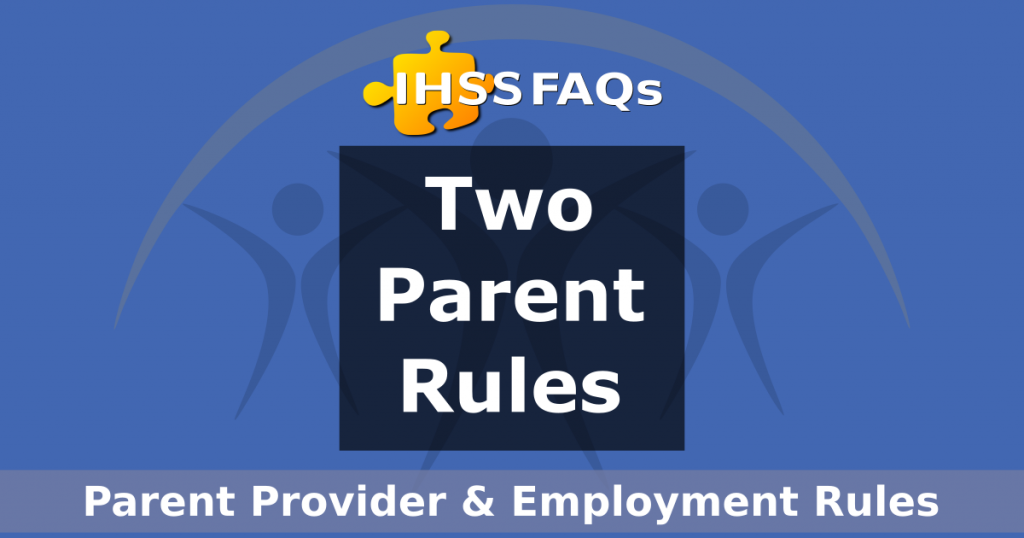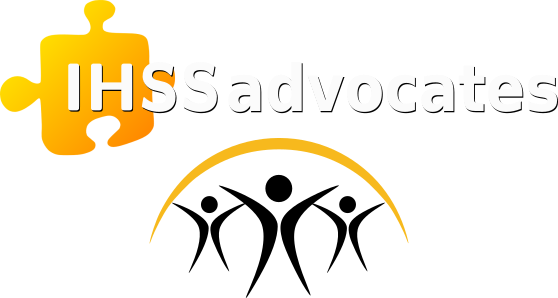Two Parent Rules
“We have been getting a lot of calls lately from parent providers about the “two parent rules”. When reconstructed in a different order, the expressed intent of the regulations are much easier to understand. It is kind of like putting together the pieces of a puzzle.” ~ Advocate, Larry Rosen
Below are MPP’s addressing parent provider employment rules. Instead of simply copying and pasting MPP § 30-763.45, the following IHSS laws are shown in an order to make it easier to visualize.
1. MPP § 30-757.17:
“.17 Protective Supervision consists of observing recipient behavior and intervening as appropriate in order to safeguard the recipient against injury, hazard, or accident.
.171 Protective Supervision is available for observing the behavior of nonself-directing, confused, mentally impaired, or mentally ill persons only.
(a) Protective Supervision may be provided through the following, or combination of the following arrangements.
(1) In-Home Supportive Services program;
(2) Alternative resources such as adult or child day care centers, community resource centers, Senior Centers; respite centers;
(3) Voluntary resources;
(4) Repealed by Manual Letter No. SS-07-01”
AR’s note: as stated above, IHSS may be provided for in one of three ways (or in combination): through formal IHSS authorization and payment, alternative resources (ie., during school or child day care centers) and / or through voluntary resources.
2. MPP § 30-763.455:
“.45 When the recipient is under eighteen years of age and is living with the recipient’s parent(s), who has a legal duty under the Family Code to provide for the care of his/her child, the IHSS specified in Section 30-763.456 may be purchased from a parent under the following condition:
.455 A parent provider who meets the requirements in Section 30-763.451 shall be paid for performing authorized services regardless of the presence of the other parent in the home, including non-work hours, weekends, and holidays.”
AR’s note: as long as a parent provider (of a minor) satisfies the requirements appearing under MPP § 30-763.451, said provider will be paid for authorized services regardless of whether the non-provider parent is at home.
3. MPP § 30-763.451:
“.451 The parent has left full-time employment or is prevented from obtaining full-time employment because no other suitable provider is available and the inability of the parent to perform supportive services may result in inappropriate placement or inadequate care.
(a) For the purposes of this section, full-time employment means working an average of 40 or more hours per week regardless of worksite location. A parent providing IHSS-funded care to his/her own child is not full-time employment.”
AR’s note: to be eligible to be a parent provider, said parent must have terminated employment completely, reduced employment to below 40 hours a week on average or be prevented from working an average of 40 hours per week because there is no other suitable / available provider.
4. MPP § 30-763.452:
“.452 For the purposes of Section 30-763.451, a suitable provider is any person who is willing, able, and available to provide the needed IHSS. A suitable provider who is a person having a duty pursuant to the Family Code need only be able and available to provide the needed IHSS; the person is only considered to be unavailable if that unavailability occurs during a time the recipient must receive a specific service, for the following reasons: employment, enrollment in an educational or vocational training program, or employment searches.”
AR’s note: per MPP § 30-763.451 a suitable provider (pursuant to Family Code) is anyone willing, able, and available to provide care. A non-provider parent is considered unavailable if that unavailability is due to, among other things, employment and employment searches, and it occurs during a time recipient must receive a specific service. First, “employment” is referenced; not “full-time employment.” Second, when the regulation mentions “during a time recipient must receive a specific service” the provider of that specific service could be the paid IHSS provider, the alternate resource of school or a friend/relative who agrees to provide voluntary services.
In summary, MPP § 30-763.455 provides expressed language indicating that the presence of a non-provider parent does not impact the ability of the provider parent to be the paid provider of IHSS services to their minor child when both parents are present in the home and when specific requirements are met. The notion that the non-provider parent must be employed full time is not supported by the regulations. In addition, it must be noted that ACL 15-45 only includes hypothetical examples in which the non-provider parent is either working full time or is not working at all.
Additionally, since ACL 17-95 indicates that:
“alternate resource are considered to be supportive services, which may be available from other agencies or programs to meet the needs of the recipient, as assessed”
ACL 17-95 (MPP Section 30-763.61)
Also, because school is expressly identified as an alternate resource in ACL 17-95, the non-provider parent is considered unavailable because he/she is employed during times when the recipient is at school, and at times when the recipient is under the supervision of the IHSS provider parent. Remember, Protective Supervision involves a 24 hr/7 day a week need. So, this caveat is met rather easily.
Click here to request a free advocate evaluation of your case.
Watch Video: IHSS Parent Provider Employment Rules

